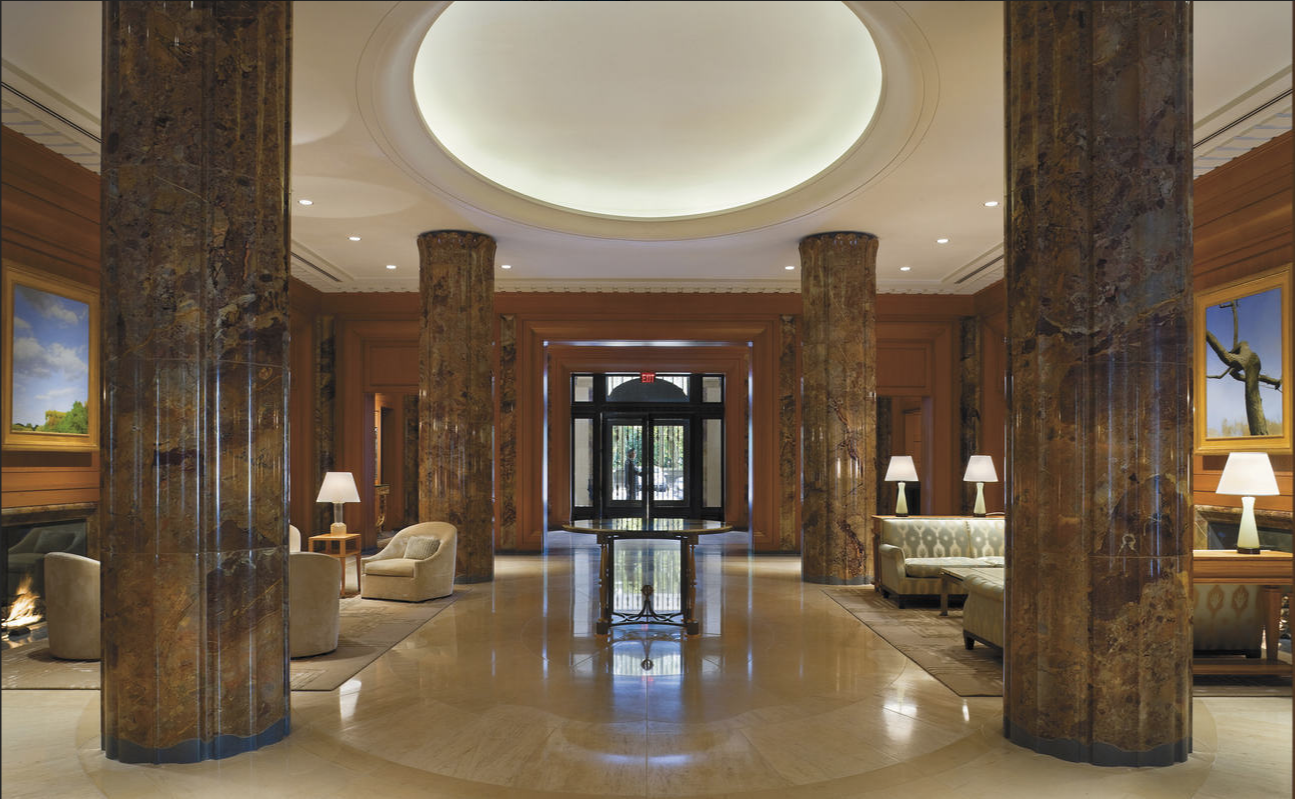No Starbucks, no jeans, no fun: The weird lobby rules of NYC's fanciest apartment buildings

The lobby of 320 Central Park West, one of the city's most exclusive co-op buildings.
In the city’s most exclusive apartment buildings, the lobby is how masters of the universe demonstrate their power. Flower arrangements, chesterfields, doormen dressed like Crimean War hussars—these kinds of things are their weapons.
Steven Gaines, in his book "The Sky's the Limit: Passion and Property in Manhattan," reports that art collector and philanthropist Jayne Wrightsman wielded her power as president of the board at 820 Fifth Ave. by determining what type of wood paneling was used in the elevator and the color of the flowers in the lobby’s vase. Barbara Streisand was famously blacklisted from best-selling author Tom Wolfe’s so-called “good buildings” after she gained a reputation for being critical of her own lobby at the Ardsley at 320 Central Park West, according to Gaines.
The lobby is, after all, a window into the upper floors. It is a symbolic space that indicates where we are in the world, what sorts of manners are required of us and, most importantly, how the board regards itself. In high-end co-ops, which tend to hold onto old-school notions of decorum, the importance of the lobby is even greater.
[Editor's Note: This article previously ran in January 2018. It is being presented again in case you missed it.]
Some more buttoned-up lobbies are conservatively wood-paneled, some lobbies are decadently gilded and lined with marble, and others are high-end but have a stripped-down minimalism, an aesthetic nod to a (still class-restricted) sort of inclusivity. But an even more important indicator of who’s who in the clubby world of cooperative living are the rules that govern behavior in a building’s public space.
How to act
High-end co-ops are famous for rules that, to the city's condo dwellers and renters, can seem like overkill. The laws of the lobby are no exception. Brokers tell tales of lobbies along Park and Fifth avenues where Starbucks coffees and blue jeans are banned, where dogs are allowed in the front door but your stroller-strapped child must take the service elevator. Gaines writes of a prestigious building that banned residents from using the lobby furniture while waiting for guests.
“The more outlandish rules are clearly a reflection of the idiosyncrasies of the board president or somebody on the board,” says Kirk Henckels, vice chairman of Stribling and the founding director of Stribling Private Brokerage. Henckels, for one, says that he would feel free to sink into an armchair in his lobby with a newspaper, “but it would probably be a one-time thing.”
Typical rules include no food or drink, no speaking on cellphones, no raised voices, no loitering, and no "aggressive behavior." For the most part, rules about deliveries, strollers, and pets are written out in black and white into the bylaws of the building, so there is no ambiguity. Other expectations, though also highly specific, go unspoken.
“Rules like 'no jeans' are rare. You don’t find rules like that in 740 Park or 720 Park,” Henckels says. “These rules also tend to crop up in post-war buildings. For instance, some of those buildings ban pets. You hardly ever see a prewar building with a no-pet policy. I am not sure I have ever seen one.”
Aspirational rule-making
Henckels adds that, in general, the quirkiest lobby rules tend to be found in B and C stature buildings that hope to up their standing by adopting antiquated policies. Daniella Schlisser, a Brown Harris Stevens broker who deals in high-end co-ops, agrees. In fact, she says that, while weird rules do exist, the majority of buildings simply ask that people practice the basic rules of politeness.

When in doubt in an upscale co-op, Schlisser says, err on the side of caution.
“I have never been given rules, but I am very mindful of behavior in the lobby,” Schlisser says. “For instance, I would go home and change rather than go into one of these building in a pair of jeans.”
'Proper' lobby behavior
Schlisser says that her clients who come to showings at top co-ops are sometimes less familiar with the finer points of expected behavior in the lobbies. She says that she has had potential buyers arrive with sweaty Starbucks iced coffees and immediately set them down on the lobby coffee table. When this sort of thing happens, she tries to inconspicuously steer the client away from the iceberg.
“I’ll offer to hold it for them instead,” she says, adding that she often coaches her clients on lobby etiquette ahead of time.
“If my clients starts talking too loudly, I would say something like, ‘Let’s be respectful of the other residents,’ in a low voice,” she says. “If they start asking about the property, I would say, ‘Let’s discuss that when we get inside the apartment.’”
Using a soft voice isn’t just good manners—it could make or break a deal.
Watch what you say
“The doormen know everything,” Henckels says. “If you or your client are badly behaved, the board will find out about it.”
And that goes doubly for kvetching about the flowers or how the furniture is “so old-fashioned.” The prospective buyer who voices such opinions doesn’t stand a chance.
Henckels says that for those who already own within a building, there are still consequences for ill-advised familiarity. Think passive aggression and blackballing.
“It is kind of like being in school and being a jerk. People in the building are not going to treat you well,” he says. “What goes around comes around. And when that person decides to sell and move to another building, if the supers know each other, they will get turned down. I have seen that on more than one occasion.”
You Might Also Like






























